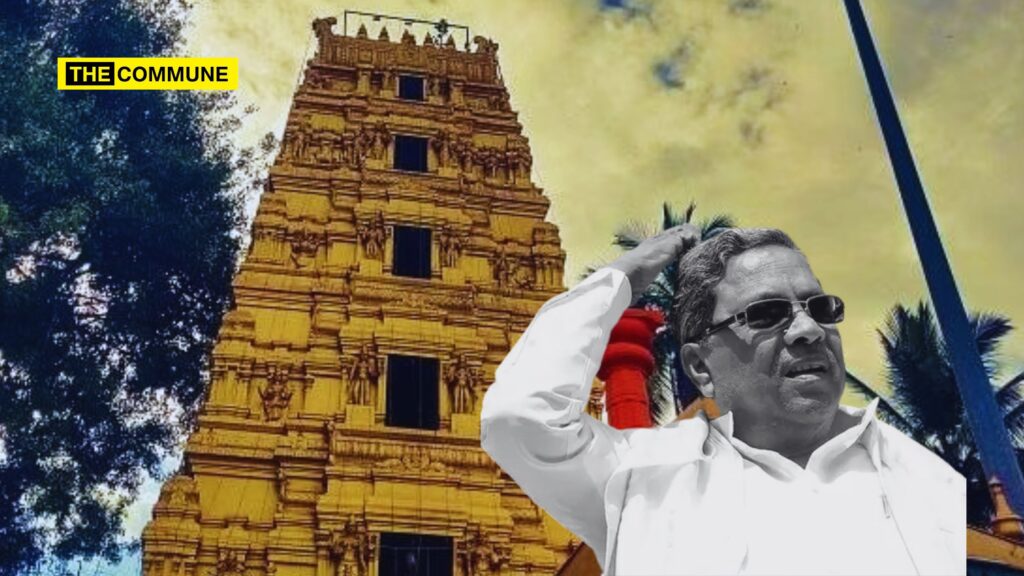The Karnataka Legislative Assembly, in its sixteenth assembly during the third session, introduced the Karnataka Hindu Religious Institutions and Charitable Charities (Amendment) Bill, 2024, identified as Assembly Bill No-11 of 2024 on 21 February 2024. This bill sought to amend the Karnataka Hindu Religious Institutions and Charitable Endowments Act, 1997 (Karnataka Act 33 of 2001) and the bill was passed in the Karnataka Assembly as well.
Yesterday karnataka govt made Amendment to Karnataka Temple endowment act.
Now, non hindus can become member of temple trustee
Islamisation of temple started in karnataka pic.twitter.com/pzDmTt3XYB
— 🚩Mohan Gowda🇮🇳 (@MohanGowda_HJS) February 21, 2024
The revised provisions entail the following:
a. Temples with an annual income surpassing ₹one crore must allocate 10% of their earnings to a newly established ‘Common Pool Fund’ (CPF).
b. Similarly, temples generating an annual income ranging from ₹10 lakh to one crore rupees are obliged to contribute 5% of their income to the same fund.
Section 19(a) specifies that the resources amassed within the Common Pool Fund may be utilized for the welfare of “poor and needy organizations,” a term that lacks a clear definition. Detractors contend that this ambiguous language creates a potential loophole, raising concerns about the misuse of temple funds, and diverting them from their intended religious and community-oriented objectives.
Adding to the controversy, Section 25 introduces a provision permitting the inclusion of members from both Hindu and other religious communities in the management committee of composite institutions. Critics argue that this decision infringes upon the autonomy and traditional management frameworks of Hindu temples.
Karnataka Government has introduced Hindu Religious Endowments amendment act in Karnataka Assembly today and passed the bill.
1. Temples which is having income more than 1 cr. should give 10% to common pool fund.
2. Temples which is having income from 10L to 1 cr. should give…— Girish Bharadwaj (@Girishvhp) February 21, 2024
The provision states that the Management Committee shall consist of not more than nine members chosen from among the devotees and followers of Hindu religious institutions and beneficiaries of charitable institutions. This committee will include the head priest or priest related to a temple, one individual from the Scheduled Caste or Scheduled Tribe, two women, and a person residing at the location where the establishment is situated.
Critics of these amendments vehemently oppose them, denouncing the measures as ‘anti-Hindu’ tactics designed to divert funds from temples and redistribute them to other religious institutions. They assert that such measures erode the autonomy and sanctity of Hindu religious institutions, giving rise to apprehensions regarding the fair allocation and administration of temple resources.
The introduced amendments have ignited a fervent debate within the state. Supporters contend that the changes foster inclusivity and fair resource distribution, while dissenting voices stand firm in their objection, perceiving the provisions as a potential encroachment on the sacredness and autonomy of Hindu temples.
The opposition Bharatiya Janata Party (BJP) swiftly denounced the amendments, labeling them as ‘anti-Hindu.’ Users on social media platform X have expressed strong disapproval towards the Karnataka government, characterising the move as a ‘legal method of looting temples.’
ರಾಜ್ಯದಲ್ಲಿ ಸರಣೀ ರೂಪದಲ್ಲಿ ಹಿಂದೂ ವಿರೋಧಿ ಧೋರಣೆ ಅನುಸರಿಸುತ್ತಿರುವ ಕಾಂಗ್ರೆಸ್ ಸರ್ಕಾರ ಇದೀಗ ತನ್ನ ಬರಿದಾಗಿರುವ ಬೊಕ್ಕಸ ತುಂಬಿಸಿಕೊಳ್ಳಲು ಹಿಂದೂ ದೇವಾಲಯಗಳ ಆದಾಯದ ಮೇಲೂ ವಕ್ರ ದೃಷ್ಟಿ ಬೀರಿ ಹಿಂದೂ ಧಾರ್ಮಿಕ ಸಂಸ್ಥೆಗಳ ಮತ್ತು ಧರ್ಮಾದಾಯ ದತ್ತಿಗಳ ವಿಧೇಯಕವನ್ನು ಮಂಡಿಸಿ ಅಂಗೀಕಾರ ಪಡೆದು ಕೊಂಡಿದೆ.
ಇದರ ಅನುಸಾರ ಇನ್ನು ಮುಂದೆ 1… pic.twitter.com/UwcN7yjjss
— Vijayendra Yediyurappa (@BYVijayendra) February 21, 2024
(with inputs from Swarajya)
Subscribe to our channels on Telegram, WhatsApp, and Instagram and get the best stories of the day delivered to you personally.

